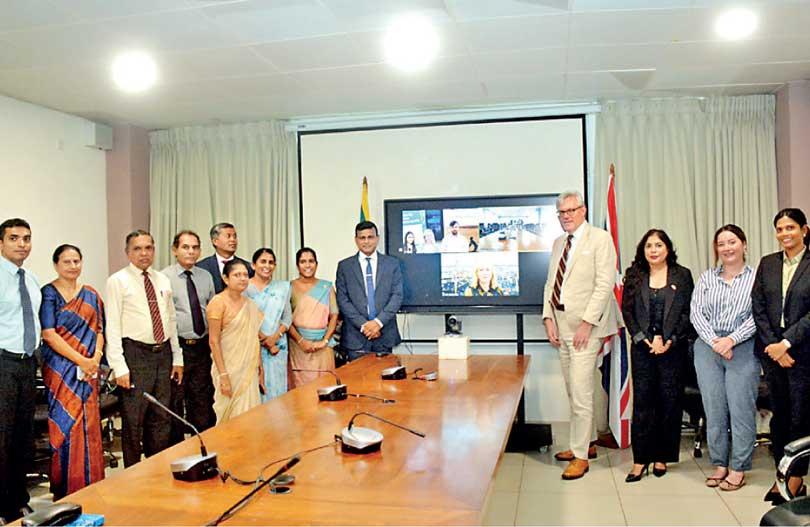Reply To:
Name - Reply Comment

The Ministry of the Environment and the UK government’s Department for the Environment, Food and Rural Affairs signed a Memorandum of Understanding (MoU) between the two nations, to protect and enhance the marine environment.
Mr. Prabath Chadrakeerthi, Secretary, Ministry of Environment and Sara Rusling, Deputy Director for the UK’s Department for Environment, Food and Rural Affairs (Defra) signed the agreement that represents a united effort to work together to protect and enhance marine ecosystems to support biodiversity and good water quality, whilst also providing sustainable seafood for Sri Lankans.
Through the UK’s Ocean Country Partnership Programme (OCPP), Sri Lanka and the UK will be collaborating to tackle the three key challenges of marine biodiversity, marine pollution and sustainable seafood. The OCPP aims to support the marine environment and to make a positive impact on the livelihoods of coastal communities that depend on healthy marine ecosystems.
The MoU recognises work that has been taking place over the last few years that includes joint research on plastic pollution, setting up new microplastics laboratories, knowledge exchange on scientific methods to support water quality monitoring and collaboration to enhance Sri Lanka’s Marine Protected Areas to meet the country’s conservation ambitions and biodiversity commitments. The programme also focuses on marine pollution emergency response techniques, with a focus on the environmental aspects of prevention, preparedness and response. Joint work has also taken place around enabling safe and sustainable seafood production, particularly with regards to aquaculture.
The OCPP programme also includes work with the Association of Commonwealth Universities (ACU), providing scholarships for Masters students hosted by the University of Kelaniya and the University of Peradeniya.
The scholarships will enable scholars from Sri Lanka to harness their regional knowledge and conduct vital research that will contribute to the conservation and sustainable management of marine resources, and strengthen responses to marine environmental challenges.
Mr. Chandrakeerthi said, “We are going to celebrate a new chapter of collaboration and progress as we unite in purpose at the signing of this agreement. Together, we’re not just signing papers, we’re shaping the future, unlocking opportunities, and fostering innovation. With the signing of this agreement between the Government of the United Kingdom of Great Britain and Northern Ireland and the government of Sri Lanka, it is expected that the two parties may implement activities and exchange of relevant scientific and technical information, capacity-building training and conduct collaborative research and execute pilot projects to sensitize local stakeholders on blue economy and marine spatial planning, provide consultation and exchange of good practices.
This MoU will provide a framework within which the parties can discuss and investigate areas in which to make research collaborations under the Blue Planet Fund’s Ocean Country Partnership Programme covering marine pollution, biodiversity, ecosystem restoration, climate or environmental and other public health monitoring in order to protect the marine environment and reduce poverty, which may be of potential interest and benefit to both participants.”
The UK Marine Minister, Lord Benyon said,“The UK and Sri Lanka have a long history of collaboration, and through our joint work have already made important progress on tackling marine pollution and supporting the biodiversity of Sri Lanka’s waters.
This agreement formalises our efforts to secure a healthy marine environment, and through the UK’s Ocean Country Partnership Programme, will help us tackle the pivotal challenges faced by marine life and coastal communities in the future.”
Next steps in the partnership will see the UK team continue to work with Sri Lanka Government departments and agencies, Sri Lanka Universities, NGO partners and civil society organisations to:
Increase data and evidence on the marine environment (habitats and species mapping and condition assessments), threats and impacts (such as pollution and Illegal Unreported U fishing), and supporting information needed for sustainable expansion of marine industry.
Collaborate with key Sri Lankan stakeholders to increase resources and capacity through targeted training and knowledge sharing.
Work together to reduce the prevalence of marine pollution and its impacts through a range of approaches.
Sustainably grow the Sri Lankan blue economy in an informed and inclusive manner to support sustainable livelihoods.
Increase the sustainability of the fisheries sector, including, increasing yields and production in aquaculture and reducing impacts of fisheries on the marine environment.